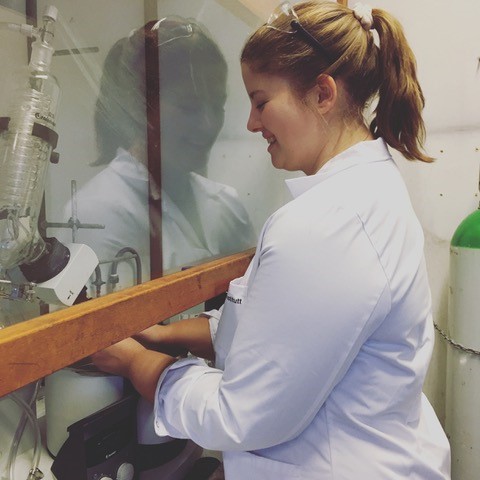We are continuing our series of interviews with young scientists involved with 6-month experiments granted by MAX4ESSFUN. This time Josefine Eilsø Nielsen from the University of Oslo is asked to describe her research into antimicrobial peptides interaction with lipid model membranes.

Josefine is a first-year PhD student at the Department of Chemistry at the University of Oslo. She works in the group of Associate Professor Reidar Lund, focusing on research into antimicrobial peptides interaction with lipid model membranes (using lipid vesicles and supported bilayers).
– In my work, I use different scattering techniques including Small Angle Neutron and X-ray Scattering (SANS and SAXS) and Neutron Reflectometry (NR).
Combining results from scattering methods gains understanding
Bacterial resistance towards conventional antibiotics represents a major setback of modern medicine and desperately calls for innovation of new compounds and strategies. Antimicrobial peptides are a group of molecules that are a natural part of the human immune system shown to have effect against a broad spectrum of pathogens including both gram positive and gram negative bacteria.
– When combining the results from scattering methods, together with other complimentary techniques, we gain biochemical and biophysical understanding of these systems, Josefine says. This knowledge can be used in the development of new antibiotics for the future based on antimicrobial peptides designed specifically for the task.
Josefine did her master project in pharmacy at the chemistry department focusing on temperature sensitive co-block polymers. During this period, she went to the research reactor at IFE, Kjeller in Norway for some SANS measurements, and also took a neutron course at the same facility.
– I found the scattering method really interesting, and I therefor looked for a PhD position in the field. The most interesting part of my research is that the project I am working on combines knowledge about cell biology, biochemistry, physical chemistry and pharmacology which I have from my Pharmacy background, with state of the art scattering techniques.
Collaboration with Malmö university
Josefine Eilsø Nielsen felt that the collaboration with Marité Cardenas group at Malmö university was extremely valuable for the project.
– They are really experts in lipids and neutron reflectometry, while our group in Oslo mainly have specialized in small-angle scattering techniques. When combining these two methods we can hopefully both get an understanding of how the peptides interact with the surface on the membrane and the cell (lipid vesicle) in bulk.
She travelled to Malmö for two weeks in August to learn the QCM-D method from Marité Cardenas and her post doc Tania Lind. During this stay they got some really interesting results showing that you can clearly see an interaction between the peptide we are investigating and a supported lipid bilayer dependent on temperature, concentration of peptide and salt concentration.
– To fully understand the interaction, we are going to a beam time at ILL in France to do Neutron Reflectomery together with Marité Cardenas group. We have also had visits from Marité Cardenas group here in Oslo where we discuss the results and the progress of the project.
– I hope to get some really nice results from Neutron Reflectometry and SANS showing the interaction between antimicrobial peptides and lipid bilayers, and that we from these results are able to clarify the mechanism of action for the peptides. Further we would like to try out new engineered peptides and peptoids that can be promising candidates for future antibiotics.
Short facts:
Young researcher: Josefine Eilsø Nielsen
University: University of Oslo
Experiment: Mapping out the interactions of antimicrobial peptides with model lipid membranes using neutron reflectometry
Experiment period: 2017-05-11–2017-11-11
Supervisor: Reidar Lund, University of Oslo
Co-supervisor: Marité Cardenas, Malmö University